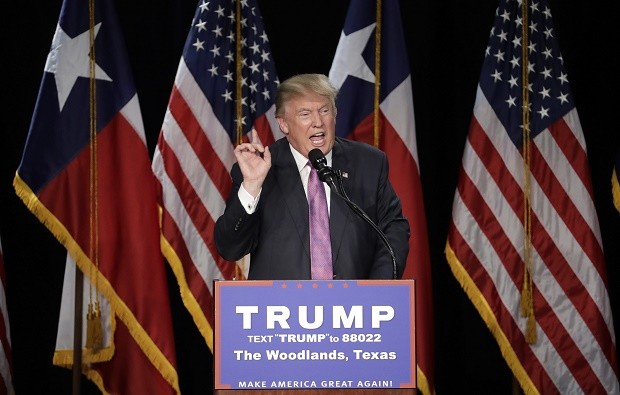
Republican presidential candidate Donald Trump speaks during a rally Friday, June 17, 2016, in The Woodlands, Texas. AP
WASHINGTON — If Donald Trump’s Republican Party were a family and its national convention a reunion, a therapist might say there are issues to resolve.
For all his harangues, the blustery billionaire remains on track to become the party’s nominee at its Cleveland gathering next month. Yet his incendiary comments following the Orlando massacre have rattled the GOP, and pockets of apprehension and outright defiance are, if anything, growing.
More congressional Republicans are not endorsing Trump and planning to skip the convention. Rep. Duncan Hunter, R-Calif., one of Trump’s top House backers, says his support among lawmakers “has stalled.” And there’s a longshot movement among conservative delegates and operatives — including supporters of Trump’s vanquished rival, Texas Sen. Ted Cruz — to change party rules so the convention can pick a different nominee.
“We’re acting to save the Republican Party from imminent disaster,” said Steve Lonegan, who chaired Cruz’s New Jersey campaign and is helping organize an effort to let delegates chosen to back one candidate vote instead for another.
Lonegan, others leading the drive and Cruz aides say the Texas senator is not involved in that effort.
Yet even with Trump’s poll numbers dipping, many of his harshest GOP critics concede it’s likely too late to pick someone else in Cleveland. They say such efforts lack sufficient support, are disorganized and have no alternative candidate.
That view prevails even after a shooter left 49 people dead in Orlando and Trump suggested that President Barack Obama was sympathetic to Islamic extremists, saying “there’s something going on.”
Asked what line Trump must traverse before imperiling his own nomination, Trump detractor Rep. Reid Ribble, R-Wis., said, “I don’t know, because I think he’s crossed it 20 times already.”
Congressional Republicans aren’t hesitating to distance themselves from Trump, who this month asserted that a Mexican-American judge couldn’t fairly preside over a Trump civil case.
House Speaker Paul Ryan, R-Wis., who’s unenthusiastically backed Trump, said in an interview recorded for NBC’s Sunday show “Meet the Press” that GOP lawmakers should follow “their conscience” when considering endorsing Trump. Others not supporting him or attending the convention include House Energy and Commerce Committee Chairman Fred Upton, R-Mich., who for the first time in his 30-year congressional career is not backing the party nominee.
Many say, like him or not, Trump won and efforts to dump him would be crushed and would devastate the GOP. According to The Associated Press, Trump has 1,542 delegates, including 1,447 required by party rules to back his nomination, well above the 1,237 needed for victory.
One catch: Delegates “bound” to one candidate can vote freely in convention rules fights. Delegates could sour on Trump and approve procedures opening the door to an alternative.
“It’s a fantasy, it won’t happen,” said Morton Blackwell, a Republican National Committee member from Virginia who initially backed Cruz.
“We have a responsibility to respect our democracy, and that means we accept the outcome of the vote,” said Rep. Austin Scott, R-Ga., who supported the presidential bid of Sen. Marco Rubio, R-Fla.
READ: ‘Highly offensive’: GOP lawmakers distance selves from Trump
Some are trying anyway.
Kendal Unruh, a Cruz delegate from Colorado, is helping lead the drive to allow delegates bound by current rules to one candidate to instead cast a “vote of conscience” for another. Delegates could do so if their original candidate has committed “grievous acts” including scandal, crimes or supporting views “in gross violation” of GOP stances.
Ryan, who has said he doesn’t want to be an alternative should Trump falter, didn’t know Unruh — like him — used the word “conscience,” said Ryan spokeswoman Ashlee Strong.
Unruh’s group, which Lonegan is helping, is using social media and emails and held a conference call Thursday night to organize efforts to find support.
To prevail, Unruh needs a majority of the 112 members of the convention rules committee, which has two delegates from each state and territory. Then, a majority of the full convention’s 2,472 delegates would have to approve.
There’s a Plan B. If Unruh can win over one-fourth support from the rules committee — just 29 delegates — the full convention must vote on her proposal. So far she’s got around 10 supporters though some prefer delaying the rule’s impact until the 2020 convention, she said.
“Circumstances change and delegates aren’t robots,” said Unruh, who cited Trump’s belittling of a Mexican-American judge as grounds to abandon him.
Party officials looking to smooth Trump’s convention path are already counting noses.
Randy Evans, Georgia’s RNC committeeman, says his informal tally suggests it will be a “pretty tall order” to prevent the full convention from voting on unbinding delegates. But he said he expects Trump forces to win a convention floor showdown “pretty comfortably.”
“They can make everything look tumultuous,” Cindy Costa, South Carolina’s RNC committeewoman, said of those attempting to let delegates vote freely. But it would be “a big mistake” and would lose, she said.
In one indication Trump is moving to assert control, one of his operatives ensured at a meeting of Maryland delegates that the state’s two slots on the convention rules committee went to Trump supporters, said Louis Pope, the state’s RNC committeeman.
READ: Clinton, Trump kick off their White House war